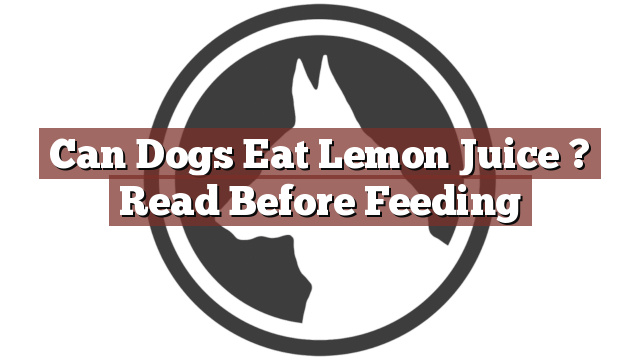Understanding Your Dog’s Dietary Needs
As responsible pet owners, it is crucial to have a good understanding of our dogs’ dietary needs. While dogs are primarily carnivorous, their digestive systems have evolved to tolerate certain fruits and vegetables in moderation. However, not all human foods are safe for dogs and can potentially harm their health. Therefore, it is essential to research and consult with a veterinarian before introducing any new food or drink into your dog’s diet. One common question that arises is, "Can dogs eat lemon juice?" Let’s explore this topic further.
Can Dogs Eat Lemon Juice? Read Before Feeding
Can dogs consume lemon juice? The simple answer is no. Lemon juice, whether diluted or not, is not recommended for dogs. While lemons contain certain vitamins and minerals beneficial to humans, they can be harmful to our furry friends. The high levels of citric acid found in lemons can cause an upset stomach, vomiting, or diarrhea in dogs. Additionally, the citrus scent and taste may repel dogs, making them uninterested in consuming lemon juice.
Pros and Cons of Feeding Lemon Juice to Your Dog
Although it is not advised to feed lemon juice to dogs, let’s examine the potential pros and cons.
Pros:
- Vitamin C: Lemons are an excellent source of vitamin C, which is essential for humans. However, dogs naturally produce their own vitamin C, so they do not require supplementation through lemon juice.
- Fresh Breath: Some dog owners believe that lemon juice can freshen their dog’s breath. However, this is not a reliable or recommended method, as the acidic nature of lemon juice can irritate a dog’s oral cavity.
Cons:
- Upset Stomach: The high acid content in lemons can lead to digestive issues in dogs, including vomiting, diarrhea, and stomach discomfort.
- Allergic Reactions: Dogs, like humans, can have allergies. Some dogs may have sensitivity or be allergic to the components of lemon juice, leading to adverse reactions, such as itching, rashes, or difficulty breathing.
In Conclusion: Weighing the Risks and Benefits of Lemon Juice for Dogs
Considering the potential risks and lack of significant benefits, it is best to refrain from feeding lemon juice to your dog. While a small amount of lemon juice may not cause severe harm, it is always better to err on the side of caution when it comes to our pets’ health. If you suspect your dog has consumed lemon juice or any other potentially harmful substance, it is advisable to contact your veterinarian for guidance. Remember, a well-balanced and species-appropriate diet, along with regular veterinary check-ups, is the key to keeping your furry companion healthy and happy.
Thank you for taking the time to read through our exploration of [page_title]. As every dog lover knows, our furry friends have unique dietary needs and responses, often varying from one canine to another. This is why it's paramount to approach any changes in their diet with caution and knowledge.
Before introducing any new treats or making alterations to your dog's diet based on our insights, it's crucial to consult with a veterinarian about [page_title]. Their expertise ensures that the choices you make are well-suited to your particular pet's health and well-being.
Even seemingly harmless foods can sometimes lead to allergic reactions or digestive issues, which is why monitoring your dog after introducing any new food item is essential.
The content provided here on [page_title] is crafted with care, thorough research, and a genuine love for dogs. Nevertheless, it serves as a general guideline and should not be considered a substitute for professional veterinary advice.
Always prioritize the expert insights of your veterinarian, and remember that the health and happiness of your furry companion come first.
May your journey with your pet continue to be filled with joy, love, and safe culinary adventures. Happy reading, and even happier snacking for your canine friend!

